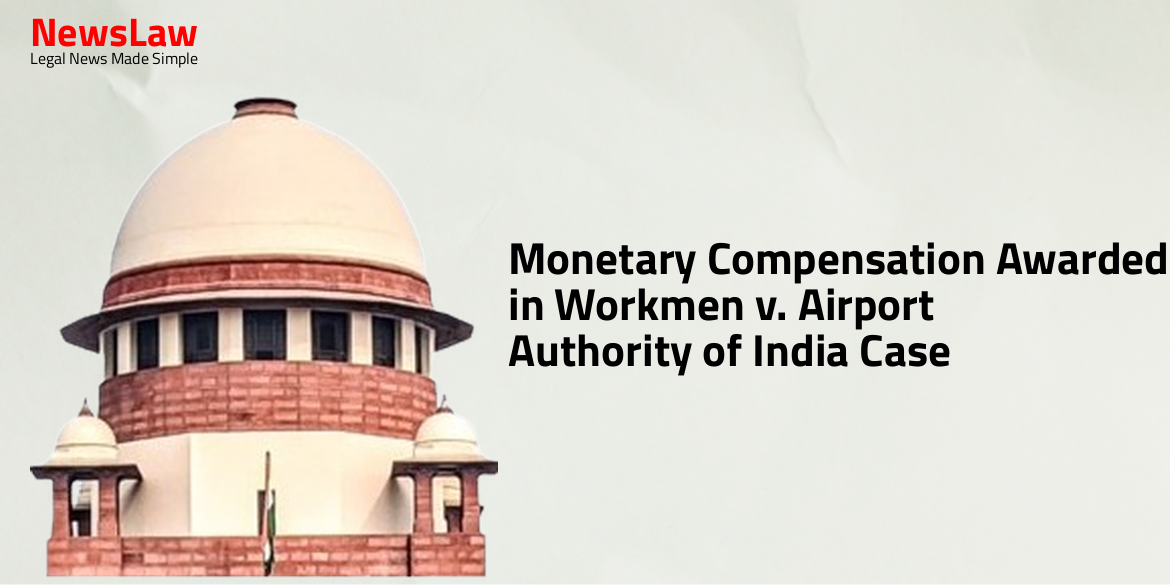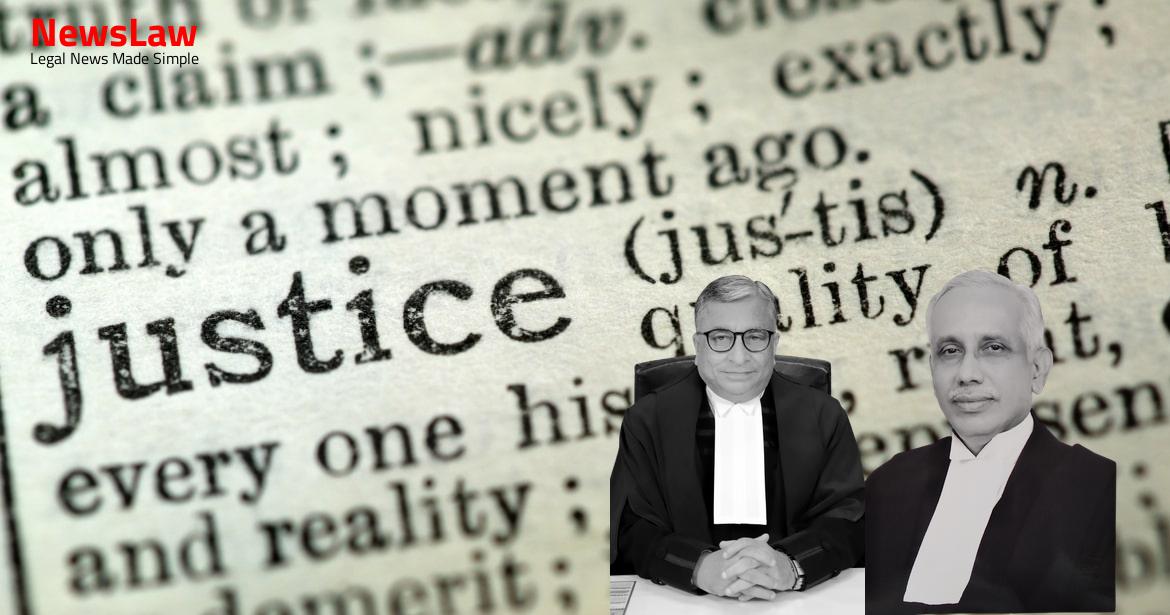In the recent legal judgment of Workmen v. Airport Authority of India, the Delhi High Court has made a significant decision regarding the award of compensation to the workers involved in the case. The Court modified the impugned Award, choosing to provide a lump-sum monetary compensation to each workman instead of reinstatement. This decision marks a crucial development in labor law jurisprudence. Read on to learn more about the details and implications of this ruling.
Facts
- Petitioner approached the Court seeking to quash the impugned award dated 16 May, 2007.
- The petition was filed under Articles 226 & 227 of the Constitution of India.
- The impugned award was passed by the Central Government Industrial Tribunal–cum–Labour Court – II, New Delhi in ID No 198/1999.
- The award directed reinstatement of the workmen with 25% back wages.
- The petitioner is a statutory body established under the Airport Authority of India Act, 1994.
- The workmen were represented through Airport Horticulture Karamchari Sangh.
- The services of the daily wager cleaner were terminated without following the procedure for retrenchment.
- The cleaner had worked for 4 years prior to his services being dispensed with.
- The Hon’ble Apex Court ordered for reinstatement of the cleaner with full back wages.
Issue
- The Labour Court framed three issues in the case.
- The first issue revolved around whether the workmen had worked 240 days in the years 1993, 1994, and 1995.
- The second issue was related to the entitlement of the workmen to reinstatement.
- The third issue focused on determining the amount of wages that the workmen were entitled to.
Arguments
- The petitioner entity contended that the payment of full back wages is discretionary and should be considered based on the facts and circumstances of the case.
- The petitioner argued that compensation is payable only in specific cases such as when the undertaking is in economic loss or has closed down, which was not the situation in this case.
- The petitioner claimed that there was no employer-employee relationship between them and the workmen as the workmen were engaged through a contractor.
- The petitioner highlighted that no document showing employment was presented by the workmen to prove their continuous work before the alleged termination.
- The petitioner’s management witness admitted that the attendance register had been destroyed, indicating a lack of evidence of employment.
- The petitioner argued that the workmen failed to provide essential documents such as power of attorney, union registration certificate, etc.
- The petitioner emphasized that the workmen were engaged with a contractor and not directly employed by them.
- The petitioner stated that the petitioner deliberately destroyed the attendance register in 2004 despite the ongoing dispute since 1999.
- The petitioner claimed that the workmen received substantial amounts under Section 17B of the Industrial Disputes Act, which should be considered in the decision of reinstatement with back wages.
- Management claims there was no employer-employee relationship with the workmen.
- No retrenchment compensation or notice pay was given to the workmen upon termination.
- Workmen were not provided legal facilities like appointment letters, leave benefits, etc.
- The workmen were not members of ESI and EPF despite working as casual laborers.
- The work was awarded to contractors for the horticulture work on a unit rate basis.
- Workmen claim the impugned Award was passed after considering all facts and circumstances.
- Petitioner failed to produce attendance registers despite multiple opportunities given.
- Petitioner disputes photocopies of attendance registers produced by workmen.
- The petitioner seeks to set aside the findings of the Labor Court as per the impugned Award.
Analysis
- The attendance registers of 1992, 1993, 1994, and 1995 were weeded out in February 2004 as being older than 5 years.
- The names of Rajinder, Ram Gopal, and Shri Ram Chander Paswan were mentioned on all photocopies of the attendance registers.
- Contract workers were engaged till November 1995, and the work of gardening was initially handled by casual labors until October 1995 when a contractor was assigned.
- The workmen’s names were observed in the attendance register photocopies for 1993, 1994, and 1995, indicating they worked at least 240 days each year as casual laborers.
- The management should have retained the original attendance register in view of the ongoing case.
- No document has been filed by the management regarding engagement of the contractor before October 1995.
- The workmen have completed 240 days of work in the years 1993, 1994, and 1995.
- The management destroyed the original attendance register for those years in 2004, raising suspicions of concealment.
- The work of gardening was performed by casual laborers until October 1995 when a contractor took over.
- The workmen are entitled to reinstatement based on the evidence presented.
- The Hon’ble Court observed that although earlier law held that reinstatement with full back wages is the normal rule for illegal termination, recent judgments have shown a shift towards granting compensation instead of reinstatement.
- The relief of reinstatement with back wages is not automatic and may not be suitable in all cases; monetary compensation may be more appropriate in certain situations.
- In cases of termination of daily-wage workers due to procedural defects, reinstatement with back wages is not guaranteed; monetary compensation can be considered as a more just relief.
- The Court emphasized considering all relevant factors such as appointment manner, length of service, and termination grounds to determine the appropriate relief for the workman.
- The Award directed reinstatement with 25% back wages for certain workmen based on evidence of their employee-employer relationship and injustice in their termination.
- Section 11A of the ID Act provides for reinstatement as a remedy for breach of provisions or service rules.
- The Tribunal has the power to order reinstatement of a workman with specific terms and conditions.
- The Tribunal may also choose to award a lesser punishment instead of dismissal as appropriate.
- Reinstatement is a key remedy in cases of breach of labour welfare legislations.
- The quantum of back wages should be decided by the labour court.
- This decision was reaffirmed in the judgement from 2003 (6 SC 141).
- It is essential for the labour court to determine the amount of back wages owed.
- The workmen waited for more than 28 years for relief from the petitioner entity.
- Workmen are not working with the petitioner entity and reinstatement is not feasible.
- Services of the workmen were terminated illegally.
- Court awards a lump-sum monetary compensation of Rs.1,50,000 to each workman instead of reinstatement.
- Workmen undertook to refund amount received under Section 17-B of the I.D Act.
- No recovery of compensation amount from workmen by the petitioner entity.
Decision
- The impugned Award dated 16 May, 2007, passed by the Labour Court is modified.
- Instead of reinstatement, a lump-sum monetary compensation of Rs.1,50,000/- is awarded to each respondent.
- The relief of reinstatement is set aside.
- The writ petition is disposed of along with any pending applications.
Case Title: AIRPORTS AUTHORITY OF INDIA Vs. RAM GOPAL & ORS. (2024:DHC:3713)
Case Number: W.P.(C)-8510/2007



